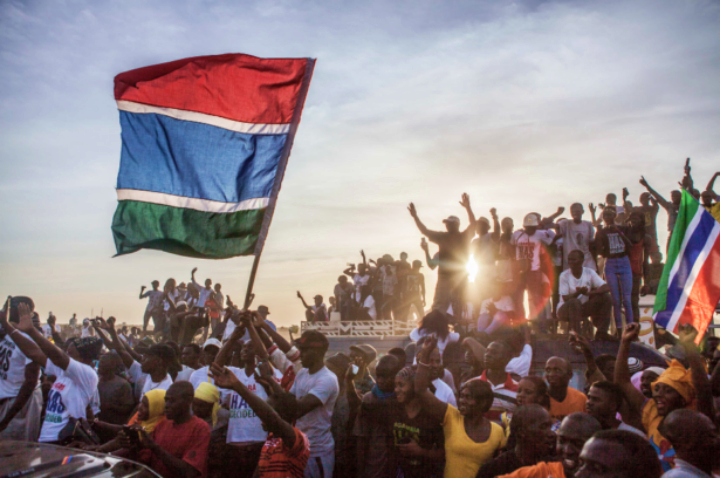Gambiaj.com – (BANJUL, The Gambia) – As the U.S. grapples with the resurgence of Donald Trump and the rise of authoritarianism, there are vital lessons to be learned from Gambia’s successful fight against tyranny. Yahya Jammeh, who ruled the small West African nation with an iron fist for 22 years, was eventually ousted in 2016 through a mass movement that combined political education, grassroots organizing, and a unique tactic — the demystification of the tyrant himself.
As part of Waging Nonviolence series of interviews with experienced organizers and movement thinkers on ways to defend and expand democracy amidst the rising authoritarian tide globally, Alieu Bah, a key figure in the #GambiaHasDecided movement, offers invaluable insights into how ordinary people can resist authoritarianism and reclaim democracy.
Jammeh came to power through a coup in 1994, ushering in a period of autocracy marked by human rights abuses, political repression, and strained relations with neighboring countries. However, his grip on power wasn’t just sustained by brute force; Jammeh built a cult of personality that convinced many Gambians, and even outside observers, that he was a pan-Africanist hero.
This image, carefully crafted through speeches rejecting international economic agreements and appealing to anti-colonial sentiments, created a mystical aura around Jammeh — one that allowed him to rule with impunity.
The lesson here for the U.S. lies in how movements in Gambia broke down this mystification process. According to Alieu Bah, who helped lead the opposition efforts, it wasn’t just protests that ended Jammeh’s rule, but the way activists exposed the contradictions between his words and actions. Jammeh’s claim to fight for the people was dismantled by exposing his oppressive actions and his crumbling promises. “Jammeh had convinced Gambians that he was the one who had come to end corruption and insecurity,” Bah explains. “But we worked to show people that he was the source of those problems.”
In much the same way, Donald Trump has built a loyal following by presenting himself as an outsider willing to “tell it like it is,” appealing to those disillusioned with traditional political systems. Despite his authoritarian tendencies, corruption scandals, and controversial policies, Trump has managed to cultivate an image that allows many to overlook or even defend his actions.
Bah draws a parallel between Jammeh and Trump, highlighting how focusing on their public personas rather than their systemic impact can allow them to thrive politically. “Trump and Jammeh both share this ego that cannot sustain itself once the mystique is broken,” Bah notes.
One of the most significant elements of the Gambian resistance was uniting diverse groups under a common purpose. Bah recalls how different factions opposed Jammeh for various reasons — some because of his tribe, others because of his humble origins as a soldier. Yet, the opposition was able to overcome these differences to rally around a single cause: removing the dictator and reclaiming democracy. “It’s important that we unite our forces,” Bah stresses. “Because the moment Jammeh fell, the forces that were supposed to advance the struggle started fighting each other. That’s a lesson for movements everywhere — to focus on a minimum program that everyone can rally around.”
This idea of a “minimum program” is crucial for American organizers who are fighting against the resurgence of authoritarianism. Bah advocates for creating a clear, unified front with an accessible message that resonates with ordinary people. “The common person in America may not immediately understand the fight against capitalism, but they will understand how the system directly affects their lives,” Bah says. Clarity in messaging and political education is key to mobilizing mass support.
The importance of solidarity and strategic nonviolence also featured heavily in Gambia’s struggle. Bah notes that while repression, imprisonment, and even torture were common under Jammeh’s regime, the movement’s response was calculated, often prioritizing safety and survival. “Martyrdom syndrome doesn’t help our cause,” Bah advises. “When we fight, we must fight smart, knowing when to pull back and when to push forward. Our goal is to live free, not die in vain.”
Building solidarity with diverse groups is another aspect where Gambia’s experience can inform U.S. movements. Bah emphasizes that American movements should prioritize local community engagement, meeting people where they are and building relationships through compassion and understanding. “Sometimes, we talk about ‘the people’ as if we’re not part of them. But we come from these communities. It’s important to explain the stakes and work together as one.”
Perhaps the most critical lesson from Gambia’s resistance is the power of demystification. Bah underscores that despots often rely on creating a sense of invincibility, convincing people that they alone can fix the problems they themselves perpetuate. In Gambia, breaking that mystique was central to Jammeh’s downfall. “Imagine Trump shows up somewhere and there’s no one there,” Bah says, pointing to the power of demystifying tyrants by undermining their persona. “These tyrants rule through mystification. But when you expose them, show that they are ordinary and fallible, the spell is broken.”
The struggle to protect democracy in the U.S. may seem daunting, but the experience of Gambian activists proves that even the most entrenched tyrants can be toppled. By uniting under a common purpose, breaking the mystique of authoritarian leaders, and engaging in strategic, compassionate community organizing, movements can defend democracy and expand freedoms — not just in America, but across the world.
The U.S. faces a critical moment in its political history. As authoritarian figures like Donald Trump attempt to consolidate power, there are clear lessons from global struggles, such as Gambia’s, that can offer guidance. By demystifying autocrats and rallying people around a common cause, movements can successfully challenge authoritarianism and push for democratic expansion. As Alieu Bah suggests, “We must live free and die free” — a rallying cry that continues to inspire.
Source: Waging Nonviolence










